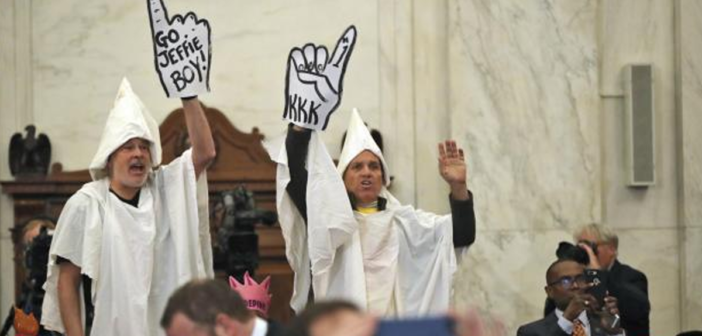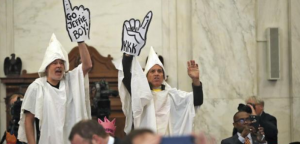
Hearings regarding incoming cabinet appointments commenced on Tuesday, with the questioning of Donald Trump’s attorney general pick, Alabama Sen. Jeff Sessions.
The duty of the U.S. attorney general is to uphold and enforce the laws of the nation — a role the NAACP and other civil rights groups argue the senator is not fit to assume.
As Republicans look to tout the senator’s extensive legal track record, Democrats aim to question Sessions’ history of racially insensitive comments, which are believed to have led to his 1986 rejection from a federal judgeship.
The 1986 nomination failure that occurred some three decades ago marks the senator’s last appearance before the Judiciary Committee. Sessions’ nomination failed, in part, due to allegations that he described the NAACP and other civil rights groups as “un-American” and alluded to a white lawyer’s being a disgrace to his race for representing African American clients.
In 1986, Sessions testified that he didn’t remember making these claims. On Tuesday, the senator denied owning these remarks, saying, “I never declared that the NAACP was ‘un-American’ or that a civil rights attorney was a ‘disgrace to his race.'”
He again pressed the matter later on Tuesday, saying allegations that he is in anyway sympathetic to groups like the Ku Klux Klan are “damnably false.”
Sessions has represented Alabama in the U.S. Senate since 1996, and responded to questions about his ability to transition from the legislative to executive branch, saying, “I don’t think I have any lack of ability to separate the roles that I’ve had.”
In regard to separating his political past from his role as attorney general, the senator stated on Tuesday that he would “recuse himself” from any prosecution that might emerge from investigations into Hillary Clinton’s private email server. Sen. Chuck Grassley noted that current Attorney General Loretta Lynch had said she would “defer” to the FBI in regard to the Clinton Foundation email investigation, but never officially recused herself from the inquiry.
When asked by Sen. Richard Blumenthal if he will also recuse himself from votes on other cabinet nominees while he is still serving in the Senate, Sessions said he will indeed recuse himself on the vote for his own confirmation but hasn’t decided on his plans for other nominees.
Leading up to and during Sessions’ opening remarks, audience members reacted audibly with chants, laughs and outbursts — after which they were removed from the hearing room.
When pressed on his past support for waterboarding as a military interrogation tactic, Sessions stood by the fact that there was once a determination that it was “proper,” but is now deemed “absolutely improper and illegal” by Congress.
Sen. Chuck Grassley, chairman of the Senate Judiciary Committee, opened the committee hearing, saying the senator’s record “is a life of public service.”
The newest member of the Senate Judiciary Committee, Sen. Dianne Feinstein also gave introductory remarks, in which she repeated her commitment to Sessions that the appointment approval process is going to be “fair and thorough.”
After introducing DREAMer Denisse Rojas as among those present in the audience, Sen. Feinstein recalled Sen. Sessions’ record in voting against the DREAM Act, which he called “a reckless proposal for mass amnesty.” Sessions also voted against attempts at immigration reform in 2006, 2007 and 2013.
In the wake of Trump’s focus throughout his presidential campaign on fixing American immigration policy and building a wall along the U.S.-Mexico border, immigration and domestic security are expected to play a major roll in cabinet appointment hearings this week.
Sen. Susan Collins listed Sessions’ state-level record of working with civil rights voter fraud cases during his 12 years as U.S. attorney in the Southern District of Alabama, a post the University of Alabama graduate assumed from 1981 to 1993. She noted the senator’s history of backing African Americans, saying, “These are not the actions of an individual who’s motivated by racial animus.”
A Senate Judiciary Committee questionnaire asked Sessions to list the 10 most significant litigated matters that he personally handled, and four of those listed involved voting rights and desegregation of public schools in Alabama.
In a questionnaire supplement, the senator clarified that his role in these listed cases was to “provide support for the Department of Justice, Civil Rights Division, attorneys. I reviewed, supported and co-signed complaints, motions, and other pleadings and briefs that were filed during my tenure as U.S. attorney. I provided assistance and guidance to the Civil Rights Division attorneys, had an open-door policy with them, and cooperated with them on these cases.”
Sen. Feinstein described a national, post-election climate of alarm in her opening remarks, saying, “There is a deep fear about what a Trump Administration will bring in many places, and this is the context in which we should consider Sessions’ record to be the chief law enforcement in America.”
In Sen. Sessions’ opening statement the cabinet nominee said he an “abiding commitment to pursuing and achieving justice and a record of doing just that.”
Reports emerged from independent ethics lawyers on Tuesday that Sessions failed to disclose his ownership of oil interests on more than 600 acres of Alabama land. While the holdings are reported to produce a small revenue in the range of $4,700 annually, Sen. Richard Blumenthal, Sen. Dianne Feinstein and others have expressed concern over the omission.
http://www.aol.com/article/2017/01/10/amid-protest-jeff-sessions-kicks-off-donald-trump-cabinet-nominee-hearings/21651872/
Dumbass Anarchists Threaten to Disrupt Trump Inauguration
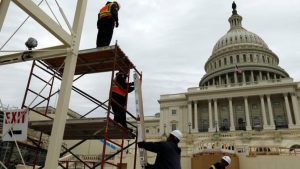
By Ian Simpson
WASHINGTON (Reuters) – Anarchist groups have threatened to shut down Republican Donald Trump’s swearing-in as U.S. president, but police in Washington said on Friday they believe the thousands of security officers assigned to the event will be able to head off any disruption.
Dozens of activist groups plan to protest the Jan. 20 inauguration of the New York real estate developer, whose supporters are counting on him to fulfill a host of controversial campaign promises including building a wall on the Mexican border and deporting millions of illegal immigrants.
Police expect some 900,000 people to flood Washington for the inauguration ceremony, which includes a parade from the U.S. Capitol to the White House along streets thronged with onlookers.
Interim Police Chief Peter Newsham told reporters on Friday that in addition to the more than two dozen activist groups that have sought permits for peaceful demonstrations, Washington police were aware of anarchist groups vowing online to interrupt the proceedings.
“The fact that you have some folks that are indicating on social media that they’re coming to shut down the inauguration events is something that we will be prepared for,” Newsham said. “We’ve experienced that type of thing before in the city and we’ll be able to handle it.”
Asked about the prospect of mass arrests, Newsham said: “That’s one of the things that we have to prepare for, but we don’t anticipate that will be the case.”
Protests are planned before, during and after the inauguration, with the biggest event the Women’s March on Washington on Jan. 21. The National Park Service said Thursday it would start issuing permits for protest sites after civil rights lawyers threatened to sue, saying the agency was quashing dissent.
About 3,000 police officers from outside the District, 5,000 National Guard troops and federal agents will staff buffer crowd-control barriers and bag checks, said Brian Ebert, the head of the Secret Service’s District field office.
Barriers will be in place to prevent any possible truck attack, such as the attacks in Berlin last month and in Nice, France, in July.
A pro-pot lobbying group has vowed to distribute 4,200 joints and light up near the inaugural site to show support for legalization of marijuana nationwide. Marijuana is legal in the District of Columbia but can only be consumed in private.
Asked if police would bust smokers, Mayor Muriel Bowser said, “That wouldn’t be our first priority.”
https://www.yahoo.com/news/anarchists-threaten-disrupt-trump-inauguration-police-ready-200453050.html
America Dollar Doing Well Because Of Trump So World Look Out
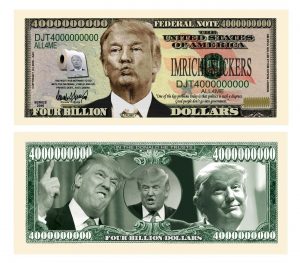
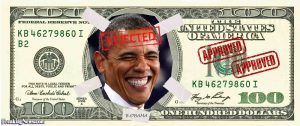
On Wall Street, the rising dollar has been one of the most visible signals of growing optimism in the U.S. economy; for many other countries, it spells trouble.
On Wall Street, the rising dollar has been one of the most visible signals of growing optimism in the U.S. economy. For many other countries, it spells trouble.
Most analysts expect the U.S. currency to strengthen in 2017, extending a gain that has boosted the value of the dollar by more than one-third since the U.S. credit downgrade in 2011.
That expectation is mostly because a strengthening economy appears likely to enable the Federal Reserve to enact its plan for multiple rate increases in 2017. Higher rates make it more attractive to hold dollar-denominated assets, attracting money into the U.S.
“Right now, there is an incredible amount of pressure to sell just about every type of currency and buy the dollar,” said Christopher Stanton, chief investment officer at Sunrise Capital LP, which manages $700 million.
Mr. Stanton recently bet that the U.S. currency will appreciate against the Australian dollar, Japanese yen and euro in the next few months.
A stronger dollar raises the buying power of U.S. consumers and businesses by making imported items cheaper and reducing the costs of traveling abroad. By the same token, however, it hurts U.S. exporters by making their goods less competitive overseas, cutting into corporate earnings and potentially weighing on stock prices.
In emerging markets, sustained dollar strength could undercut prices for oil and other dollar-denominated commodities, pressuring developing economies that export raw materials. Emerging-market companies and governments that have borrowed heavily in the U.S. currency will also find their debt more difficult to service.
For China, the rising dollar is exacerbating capital outflows and tightening liquidity, shaking markets that had enjoyed a period of relative stability for most of 2016. Chinese bond markets plunged in reaction to December’s Fed meeting, at which the U.S. central bank decided to lift rates and signaled several more boosts. Chinese regulators injected money to allay a possible credit squeeze, while stocks also fell.
China’s central bank has also had to drain $300 billion of its reserves in the first three quarters of the year, more than it spent in all of 2015, as it fought to slow the yuan’s decline against the dollar. China’s currency is down 4.3% against the dollar since October, falling to a record low. Other emerging-market currencies have been hit far worse: the Turkish lira is off nearly 15% in the last three months of the year.
Expectations of fiscal stimulus under President-elect Donald Trump “have absolutely re-energized the dollar,” said Alan Ruskin, head of G10 foreign exchange strategy at Deutsche Bank. “This is a major shift in policy dynamics.”
The Wall Street Journal Dollar Index, which measures the dollar against a basket of 16 currencies, rose 3.1% in 2016 on a late-year surge against the euro, yen and emerging markets.
Roughly 60% of clients surveyed by Citigroup believe the dollar will be either “moderately higher” or “sharply higher” against developed and emerging market currencies next year.
Some worry, however, Mr. Trump’s proposals on infrastructure spending and tax cuts may not come to fruition. And past fiscal expansions have had mixed effects on the U.S. currency.
The ICE Dollar Index rallied more than 80% between 1981 and 1985, driven by a mix of fiscal stimulus pushed through by then-President Ronald Reagan and a series of rate increases by the Federal Reserve in the decade’s early years.
But tax cuts under President George W. Bush failed to boost the dollar in the 2000s, as they were accompanied by a dovish Fed and uncertain equity markets, a Deutsche Bank report said.
Investors also expect the Fed to keep a close eye on the currency’s ascent, and raise rates at a slower pace if the dollar’s rally appears to be bruising the U.S. economy.
Thanos Bardas, a portfolio manager at Neuberger Berman overseeing $255 billion, said he took profits in December on bets that the dollar will rise against the yen, wary that the U.S. currency has risen too quickly in a short period of time.
“The markets have an extremely rosy outlook,” he said. “The smart trade is to trust but verify.”
http://www.wsj.com/articles/re-energized-dollar-looms-over-the-rest-of-the-world-1483272003
Trumps New AG Jeff Sessions may prosecute ‘sanctuary cities’ if confirmed as attorney general
Sen. Jeff Sessions is on record saying so-called “sanctuary cities” that protect illegal immigrants should be prosecuted. He himself may get that chance next year.
Mr. Sessions is president-elect Donald Trump’s pick to be the next attorney general, and if he’s confirmed, he will mark a 180-degree turn from the Obama administration on a host of issues, but nowhere more so than on immigration, where he’s been the Senate’s leading crackdown proponent.
From his first day in office, Mr. Sessions will have the power to strip some federal funding from sanctuary cities, thanks to rulings this year by the Justice Department’s inspector general, who said federal law requires localities to cooperate with immigration agents — and who provided an initial list of a handful of the worst offenders.
“The sanctuary cities thing is huge. I think most jurisdictions are going to fold like a cheap suit,” said Rosemary Jenks, government relations manager at NumbersUSA, which lobbies for stricter immigration laws.
Some sanctuary cities have already said they’ll resist any effort to change their behavior. They are being prodded by immigrant rights advocates who are calling on Senate Democrats to deny Mr. Sessions the chance to be attorney general, saying he represents a massive step backward for the Justice Department.
“The agency would become the dispenser of terror and racial intolerance should Jeff Sessions be confirmed,” said Brent Wilkes, executive director of the League of United Latin American Citizens.
http://www.washingtontimes.com/news/2016/nov/20/jeff-sessions-may-prosecute-sanctuary-cities-if-co/
Donald Trump’s Contract With America And The His 100 Day Plan To Make America Great Again
What follows is my 100-day action plan to Make America Great Again. It is a contract between myself and the American voter — and begins with restoring honesty and accountability, and bringing change to Washington. On the fi rst day of my term of offi ce, my administration will immediately pursue the following: Donald Trump’s Contract with the American Voter Six measures to clean up the corruption and special interest collusion in Washington, DC: ★ FIRST, propose a constitutional amendment to impose term limits on all members of Congress. ★ SECOND, a hiring freeze on all federal employees to reduce the federal workforce through attrition (exempting military, public safety, and public health). ★ THIRD, a requirement that for every new federal regulation, two existing regulations must be eliminated. ★ FOURTH, a fi ve-year ban on White House and Congressional offi cials becoming lobbyists after they leave government service. ★ FIFTH, a lifetime ban on White House offi cials lobbying on behalf of a foreign government. ★ SIXTH, a complete ban on foreign lobbyists raising money for American elections. Seven actions to protect American workers: ★ FIRST, I will announce my intention to renegotiate NAFTA or withdraw from the deal under Article 2205. ★ SECOND, I will announce our withdrawal from the Trans-Pacifi c Partnership. ★ THIRD, I will direct the Secretary of the Treasury to label China a currency manipulator. ★ FOURTH, I will direct the Secretary of Commerce and U.S. Trade Representative to identify all foreign trading abuses that unfairly impact American workers and direct them to use every tool under American and international law to end those abuses immediately. ★ FIFTH, I will lift the restrictions on the production of $50 trillion dollars’ worth of job-producing American energy reserves, including shale, oil, natural gas and clean coal. ★ SIXTH, lift the Obama-Clinton roadblocks and allow vital energy infrastructure projects, like the Keystone Pipeline, to move forward. ★ SEVENTH, cancel billions in payments to U.N. climate change programs and use the money to fi x America’s water and environmental infrastructure. Five actions to restore security and the constitutional rule of law: ★ FIRST, cancel every unconstitutional executive action, memorandum and order issued by President Obama. ★ SECOND, begin the process of selecting a replacement for Justice Scalia from one of the 20 judges on my list, who will uphold and defend the U.S. Constitution. ★ THIRD, cancel all federal funding to sanctuary cities. ★ FOURTH, begin removing the more than two million criminal illegal immigrants from the country and cancel visas to foreign countries that won’t take them back. ★ FIFTH, suspend immigration from terror-prone regions where vetting cannot safely occur. All vetting of people coming into our country will be considered “extreme vetting.” continued on the back
Donald J. Trump / Your signature __________________________________
LEARN MORE AT donaldjtrump.com/contract:
Continued from the front Middle Class Tax Relief and Simplification Act An economic plan designed to grow the economy 4% per year and create at least 25 million new jobs through massive tax reduction and simplification, in combination with trade reform, regulatory relief and lifting the restrictions on American energy. The largest tax reductions are for the middle class. A middle-class family with two children will get a 35% tax cut. The current number of brackets will be reduced from seven to three, and tax forms will likewise be greatly simplified. The business rate will be lowered from 35% to 15%, and the trillions of dollars of American corporate money overseas can now be brought back at a 10% rate. End the Offshoring Act Establishes tariffs to discourage companies from laying off their workers in order to relocate in other countries and ship their products back to the U.S. tax-free. American Energy and Infrastructure Act Leverages public-private partnerships, and private investments through tax incentives, to spur $1 trillion in infrastructure investment over ten years. It is revenue neutral. School Choice and Education Opportunity Act Redirects education dollars to give parents the right to send their kid to the public, private, charter, magnet, religious or home school of their choice. Ends Common Core and brings education supervision to local communities. It expands vocational and technical education, and makes two- and fouryear college more affordable. Repeal and Replace Obamacare Act Fully repeals Obamacare and replaces it with Health Savings Accounts, the ability to purchase health insurance across state lines and lets states manage Medicaid funds. Reforms will also include cutting the red tape at the FDA: there are over 4,000 drugs awaiting approval, and we especially want to speed the approval of life-saving medications. Affordable Childcare and Eldercare Act Allows Americans to deduct childcare and eldercare from their taxes, incentivizes employers to provide on-site childcare services and creates tax-free dependent care savings accounts for both young and elderly dependents, with matching contributions for low-income families. End Illegal Immigration Act Fully-funds the construction of a wall on our southern border with the full understanding that the country of Mexico will be reimbursing the United States for the full cost of such wall; establishes a two-year mandatory minimum federal prison sentence for illegally re-entering the U.S. after a previous deportation, and a five-year mandatory minimum federal prison sentence for illegally re-entering for those with felony convictions, multiple misdemeanor convictions or two or more prior deportations; also reforms visa rules to enhance penalties for overstaying and to ensure open jobs are offered to American workers first. Restoring Community Safety Act Reduces surging crime, drugs and violence by creating a task force on violent crime and increasing funding for programs that train and assist local police; increases resources for federal law enforcement agencies and federal prosecutors to dismantle criminal gangs and put violent offenders behind bars. Restoring National Security Act Rebuilds our military by eliminating the defense sequester and expanding military investment; provides veterans with the ability to receive public VA treatment or attend the private doctor of their choice; protects our vital infrastructure from cyber-attack; establishes new screening procedures for immigration to ensure those who are admitted to our country support our people and our values. Clean Up Corruption in Washington Act Enacts new ethics reforms to drain the swamp and reduce the corrupting influence of special interests on our politics. I will work with Congress to introduce the following broader legislative measures and fight for their passage within the first 100 days of my Administration: On November 8th, Americans will be voting for this 100-day plan to restore prosperity to our economy, security to our communities and honesty to our government. This is my pledge to you. And if we follow these steps, we will once more have a government of, by and for the people.
https://assets.donaldjtrump.com/_landings/contract/O-TRU-102316-Contractv02.pdf
Did Trump Back Off Promise of Special Prosecutor for Clinton
President-elect Donald Trump spent the weekend in Trump Tower in New York huddling with advisers. In an interview broadcast Sunday CBS “60 Minutes” he retreated from his promise to appoint a special prosector to investigate Hillary Clinton.
CBS correspondent Lesley Stahl, who conducted the interview said, “what we discovered . . . was that some of his signature issues at the heart of his campaign were not meant to be taken literally, but as opening bids for negotiation.”
In the interview, taped Friday at Trump’s penthouse home in Trump Tower, Trump revealed:
• The wall he wants to build on the Mexican border — his signature campaign pledge — now could have “some fencing.”
• On deporting illegal immigrants, Trump said he will first seek to deport 2 to 3 million immigrants who have criminal records, with the fate of the “terrific people” subject to future determination.
On abortion, Trump reaffirmed he will appoint anti-abortion Supreme Court justices, but ignored a direct question on whether he wants to overturn Roe v. Wade, the settled law of the land legalizing abortion.
• On gay marriage, Trump said he was not interested in overturning the law. “These cases have gone to the Supreme Court. They’ve been settled. And — I’m — I’m fine with that.”
• Trump back-pedaled on his promise to appoint a special prosecutor to investigate Hillary Clinton over her emails. “I’m going to think about it,” Trump said.
“. . . She did some bad things, I mean she did some bad things,” Trump said, prompting Stahl to ask, “I know, but a special prosecutor? You think you might . . .
To which Trump replied, making a reference to Bill and Hillary Clinton, “I don’t want to hurt them, I don’t want to hurt them. They’re, they’re good people. I don’t want to hurt them. And I will give you a very, very good and definitive answer the next time we do 60 Minutes together.”
Trump supporters made the chant “Lock her up” a standard at his rallies and at the GOP convention in Cleveland.
• Declined to say whether he would fire FBI Director James Comey. Trump excoriated Comey in July when he cleared Clinton on her use of a private email server. However, Clinton told supporters Comey’s Oct. 28 letter to Congress about reopening the email probe cost her the election.
On abortion, Trump reaffirmed he will appoint anti-abortion Supreme Court justices, but ignored a direct question on whether he wants to overturn Roe v. Wade, the settled law of the land legalizing abortion.
• On gay marriage, Trump said he was not interested in overturning the law. “These cases have gone to the Supreme Court. They’ve been settled. And — I’m — I’m fine with that.”
• Trump back-pedaled on his promise to appoint a special prosecutor to investigate Hillary Clinton over her emails. “I’m going to think about it,” Trump said.
“. . . She did some bad things, I mean she did some bad things,” Trump said, prompting Stahl to ask, “I know, but a special prosecutor? You think you might . . .
To which Trump replied, making a reference to Bill and Hillary Clinton, “I don’t want to hurt them, I don’t want to hurt them. They’re, they’re good people. I don’t want to hurt them. And I will give you a very, very good and definitive answer the next time we do 60 Minutes together.”
Trump supporters made the chant “Lock her up” a standard at his rallies and at the GOP convention in Cleveland.
• Declined to say whether he would fire FBI Director James Comey. Trump excoriated Comey in July when he cleared Clinton on her use of a private email server. However, Clinton told supporters Comey’s Oct. 28 letter to Congress about reopening the email probe cost her the election.
http://chicago.suntimes.com/news/trump-retreats-from-promise-to-tap-special-prosecutor-for-clinton/
